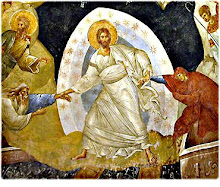
How many times have we heard, "Render unto Caesar the things that are Caesar's, and unto God the things that are God's."? Many people use this sentence to justify a sharp Church and State separation. We see this interplay of Church and State in two extremes in the example of Emperor Theodosius I. Theodosius was raised to be a Christian and was an emperor in post-Constantine
One particular story illustrates how the Church's influence over the most powerful is used in a positive way. On one occasion Theodosius was angered at an uprising in Thessalonica. The Governor of the city was killed in a riot and the Emperor ordered the killing of 7000 people that were supposedly implicated in the murder. The Bishop of Milan, Ambrose, heard of this action and was outraged that a Christian Emperor would order such a thing. He blocked Theodosius from Communion and ordered him to do penance. Ambrose had such a strong influence over Theodosius that the logistics of how he could carry out the death penalty was altered and a 30 day wait period was instituted before the Emperor could carry out an execution. Ambrose was famously quoted as saying, "The Emperor is in the Church and not above the Church."
On the flip side we observe the opposite of Church and State relations with Theodosius making the Nicene Creed and dogma the official religion of the
We look at the example of Theodosius and see the two visions of Church and State relations. This is a very complex subject that I definitely do not have the ability to answer. It is something that I have thought a good bit about because of the recent elections and many social issues that have come to the fore. Issues such as sanctity of life, justice for those less fortunate, and the struggle over all people being treated as if they are made in the image of God.
Going back to the original comment about Rendering unto Caesar and the popular perception of modern day people's thinking on how Jesus thought about the Church and State may be useful.
Jesus had just cleansed the
We have a false impression by Jesus comment, “Then render to Caesar the things that are Caesar's; and to God the things that are God's.”
Jesus is cryptic on purpose. This statement could not be used by either groups for their advantage. At face value the Romans would not see this statement as a threat.
I don't know if this blog brings up any points for discussion but I would like to know what others think about this debate. I am still working through all of this and I find Christ constantly calling me into account and I am reminded of His Kingdom and the fact that we are to pray, "Thy will be done in Heaven as on Earth."
If God were in charge how would He run this show?





